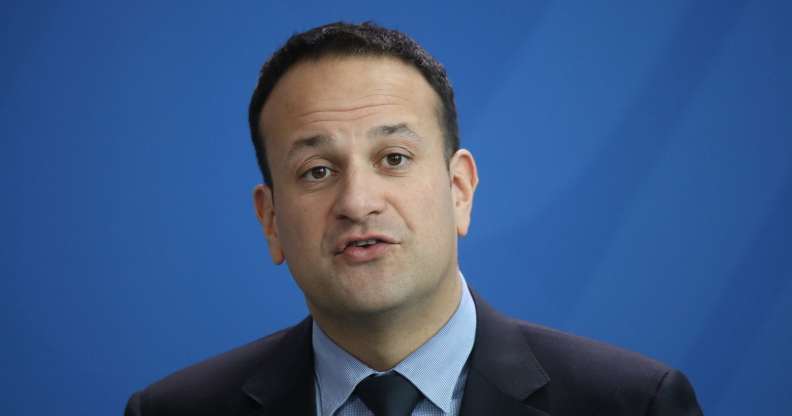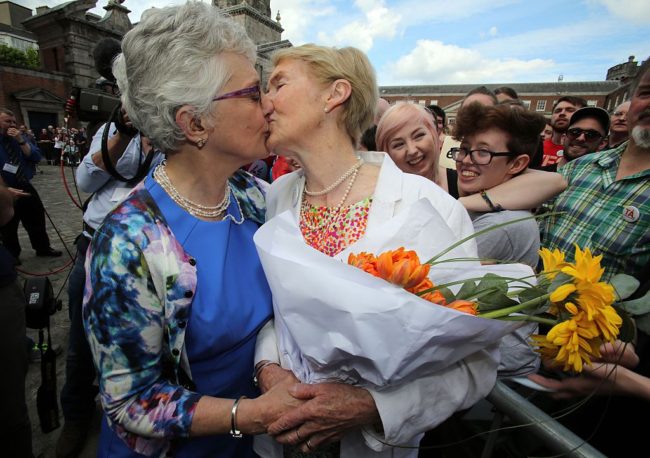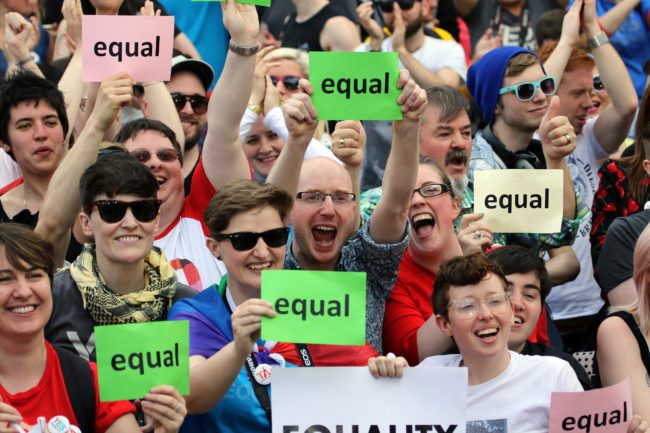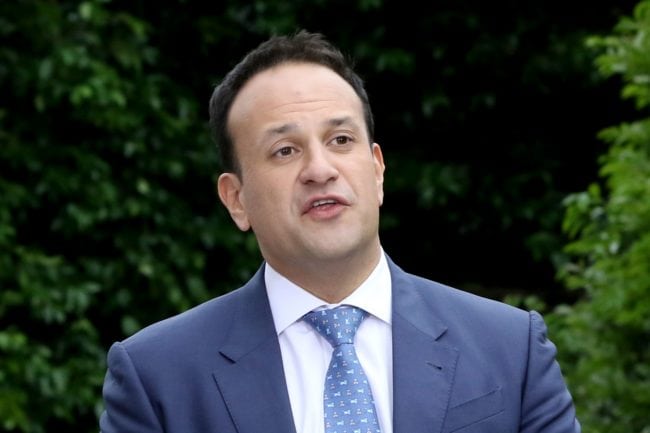Ireland marks 25 years since gay sex was decriminalised

Irish Prime Minister Leo Varadkar (Sean Gallup/Getty)
The Republic Ireland is marking 25 years since the decriminalisation of homosexuality.
The Republic of Ireland only decriminalised homosexuality in 1993, five years after its archaic sodomy law was found to be incompatible with the European Convention on Human Rights.
Prior to decriminalisation, laws dating from the nineteenth century made “buggery” an offence punishable by imprisonment, and gay men in the country lives under a culture of fear.
The law was repealed by the Criminal Law (Sexual Offences) Act, which passed through the Oireachtas on 24 June 1993.

Irish Senator Katherine Zappone (L) kisses her partner Ann Louise Gilligan (R) at Dublin Castle following the 2015 same-sex marriage referendum in Ireland (PAUL FAITH/AFP/Getty)
A State reception will be held at Dublin Castle this evening to mark the anniversary, with many LGBT activists set to attend.
The poignant location was also the setting for victory celebrations in 2015, when the country voted to legalise same-sex marriage in a constitutional referendum.
Earlier this week the anniversary was marked with an apology to men who were persecuted under the laws.
The move has a particular resonance as the apology was delivered by the Taoiseach Leo Varadkar – the country’s first openly gay leader, who took office in June 2017.
Varadkar said: “I am grateful that we all have this opportunity to mark the 25th anniversary of the decriminalisation of homosexuality in Ireland. It can be hard to change laws, and it can be even harder to change hearts and minds, to change what is considered normal, and to change a culture.
“Twenty-five years ago this week, President Mary Robinson signed into law an historic Act that brought an end to decades of cruelty and injustice. The Fianna Fáil-Labour Party coalition at the time deserves recognition for its courage in driving this change, and a special mention should be made of the then Minister for Justice, Ms Máire Geoghegan-Quinn, who piloted the legislation through this House and the Seanad.
“Several pieces of legislation were repealed in 1993. Many were historical and stretched back to the 19th century, and even before the Famine. There was some legislation from 1842 and some from 1847, with the main legislation dating from 1861 and 1885.
“While that legislation was brought through the House of Commons rather than an Irish parliament, Irish Parliaments and Irish Governments defended it nonetheless for decades.
“They were very much dogmas of a different time and they dictated how we treated and mistreated our fellow citizens, our brothers and sisters. It is oppressive to live in a constant state of humiliation and a constant state of fear. It is also deeply traumatic to feel that one is rejected by one’s own country.”

Supporters for same-sex marriage wait for the result of the referendum at Dublin Castle on May 23, 2015 in Dublin. (PAUL FAITH/AFP/Getty)
He added: “I was born in 1979, and in the three years before that, there were 44 prosecutions in this country. It is not all that long ago, and it is very much in living memory. Homosexuality was seen as a perversion and trials were sometimes a cruel form of entertainment for the media and the public.
“Others saw it as a mental illness, including the medical profession at the time. For every one conviction, there were a hundred other people who lived under the stigma of prosecution, who feared having their sexual orientation made public and their lives and careers destroyed as a result.”
He added: “So much has changed since then. Three years ago, we helped to transform how this country was seen around the world when we voted so decisively for marriage equality, the first country in the world to do so by popular vote.
“Last year, I had the privilege of being elected Taoiseach by this House, something that would have been unimaginable to politicians when I was born and perhaps seemed even impossible a few short years ago.
“There are many people who helped change minds and change laws, and their contributions should also be remembered, people who fought for me and other gay people long before we fought for ourselves. I think today of people who are no longer with us – champions like Dr. Ann Louise Gilligan, someone whose courage helped to change the laws in this country.”

Irish Prime Minister Leo Varadkar (PAUL FAITH/AFP/Getty)
He added: “We have a long history of same-sex relationships in this country, and it is something we should be more aware of. Indeed, Aristotle wrote that the Celts openly approved of same-sex relationships, and there are many references to such relationships in Irish mythology. They are even provided for in Brehon law.
“It is no secret that a number of patriots who were involved in founding our State, men and women, were also gay. While the State’s laws affected gay men in a legal sense, they had a chilling effect on lesbians as well.
“Today, the people I want to pay a special tribute to on behalf of the Government are the unknown heroes, the thousands of people whose names we do not know, who were criminalised by our forebears.
“They are men and women of all ages who tried to live and love and be themselves in a society where their identity was feared and despised and who were aliens in their own country for their entire lives because they felt that love that dare not speak its name.
“We cannot erase the wrong that was done to them but we can say that we have learned as a society from their suffering. Their stories have helped to change us, as a country, for the better. They have made us more tolerant, understanding and human.”
He added: “This evening, we mark the anniversary of the decriminalisation of homosexuality in Ireland and the progress made since then.
“We have come a long way, we remember those who suffered and also acknowledge that we have much more to do.
“There is always more to do, whether it is promoting LGBT equality on other parts of this island and around the world, combatting bullying in schools or the workplace or working to improve sexual health.
“Harvey Milk reminded us of the challenge we face in society to ‘break down the myths, destroy the lies and distortions.’
“He understood why it needed to be done. We do it for ourselves, for others, and most of all, for the young.”

